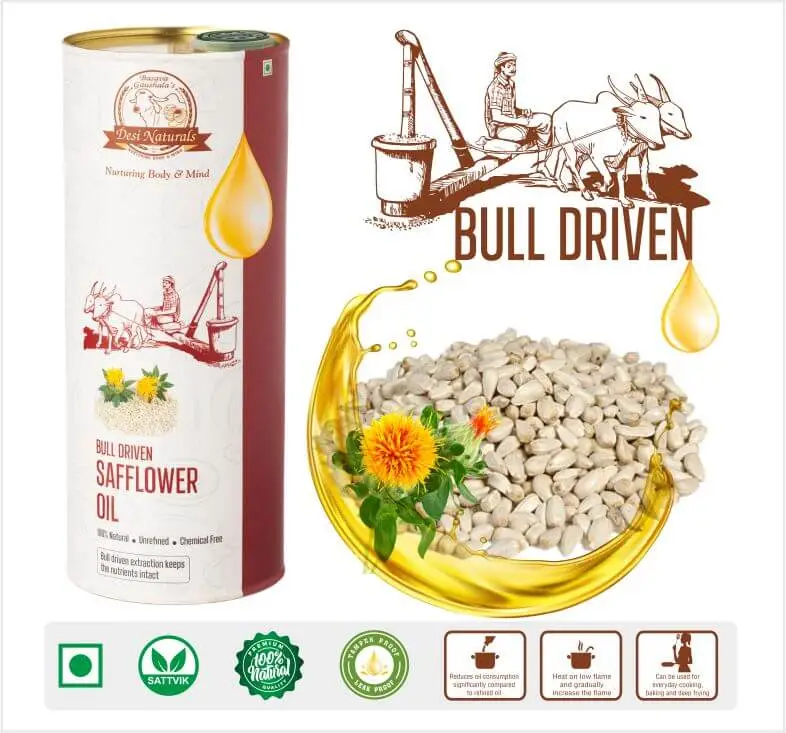
DesiNaturals™ Bull Driven Safflower Oil is traditional Bull Driven Gana Oil - a testament to natural,purity,tradition,and sustainable practices.Crafted with care and reverence for ancient desi methods, our oil is extracted using the power and precision of sacred bulls at a prolonged speed of 2-3 rounds (Cold Pressed) per minute. This ancient method preserves the oil's natural antioxidants, vitamins, other nutrients, taste and aroma. Bull-driven oils are all about quality,not quantity.This labor of love means lower yields but higher quality. At Basava Gaushala we only choose the best native seeds and nuts based on quality, flavour,nuttiness.This ensures that DesiNaturals™ oils are not just good for our health but also taste amazing with a Earthy aroma. The healthy fats in DesiNaturals™ Bull Driven oils can enhance the absorption of fat-soluble vitamins such as vitamin A,D,E,andK, when consumed with meals containing these nutrients. At Basava Gaushala we strive to Nurture human body and Mind for Vibrant health.
High in Healthy Fats: Safflower oil is rich in monounsaturated and polyunsaturated fats, particularly linoleic acid, which is an essential omega-6 fatty acid. These fats are beneficial for heart health and can help lower LDL (bad) cholesterol levels when used in place of saturated fats.
Heart Health Benefits: The high oleic acid content in safflower oil can contribute to heart health by reducing inflammation and improving cholesterol levels. Studies suggest that consuming oleic acid may lower the risk of cardiovascular diseases.
Rich Source of Vitamin E: Safflower oil is a good source of vitamin E, a potent antioxidant that helps protect cells from damage caused by free radicals. Vitamin E also plays a role in supporting immune function and promoting healthy skin.
Selection of Safflower Seeds: High-quality safflower seeds would have been selected for oil extraction.These seeds would have been free from mold, pests,and other contaminants.
Cleaning and Drying: The seeds would have been cleaned to remove any debris or dirt.Then they would be dried thoroughly to reduce moisture content, which helps in preventing spoilage during storage.
Extraction: Traditional methods of oil extraction would have been employed.This might include methods like cold pressing or expeller pressing.Cold pressing involves pressing the seeds at low temperatures to retain the flavor and nutritional quality of the oil,while expeller pressing involves using mechanical pressure to extract the oil.
Grinding or Crushing: The dried safflower seeds might have been ground or crushed to facilitate the oil extraction process.
Pressing: In Vedic times, pressing the crushed seeds to extract oil might have been done manually using wooden or stone presses.This process would involve applying pressure to the crushed seeds to squeeze out the oil.
Filtration: Once the oil is extracted,it would be filtered to remove any remaining solids or impurities.This could be done using natural materials like cloth or sieves.
Settling and Storage: The filtered oil would then be allowed to settle to separate any remaining impurities that might have passed through the filtration process.After settling,the clear oil would be decanted or poured off,leaving behind any sediment.The oil would then be stored in clean,airtight containers away from light and heat to maintain its freshness and quality.
This traditional process might differ slightly based on specific cultural practices and regional variations,but it generally outlines the steps involved in making safflower oil using Vedic methods.